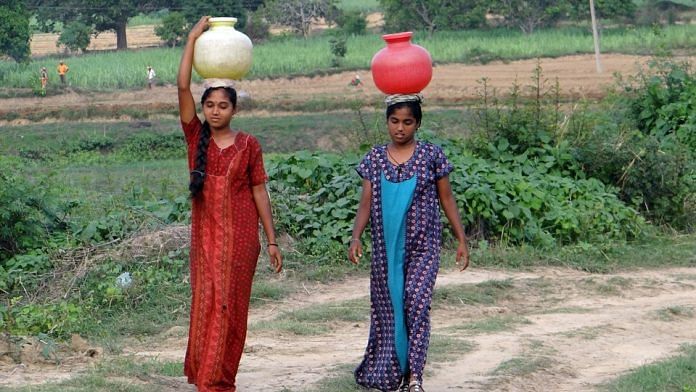New Delhi: In villages of Bihar where open defecation is still practiced, groundwater is 35.7 times more likely to be contaminated by faecal matter as compared to villages that have become open defecation free (ODF), according to a UNICEF report.
The report was released at a function organised by the newly-formed Jal Shakti ministry Wednesday.
The UNICEF study found that in villages of West Bengal and Odisha that are not ODF, the groundwater is 6.5 times and 5.3 times more likely to be contaminated as compared to ODF villages.
Things are no better for water stored at homes.
The study found that the risk of faecal contamination of household storage water in non-ODF villages of West Bengal was 4.14 times higher than in ODF villages. In Bihar and Odisha, the figure was 2.74 and 1.44 times respectively, with the average of the three states being 2.77.
UNICEF collected a total of 725 samples from 12 ODF and 12 non-ODF villages with a population of over 500 across the three states. The samples were tested at Sriram Laboratory in New Delhi for groundwater, soil and food contamination.
Speaking at the launch, Jal Shakti minister Gajendra Singh Shekhawat said the study has established that cleanliness affects all aspects of the environment — be it groundwater, surface water, soil or air — as well as health and well-being of the communities that are ODF.
“While the study clearly highlights the risk that open defecation poses, it also shows how villages that have been declared ODF under the government’s flagship Swachh Bharat Mission have benefitted,” he said.
He said the study will add to the 2018 World Health Organisation report, which had estimated that the Swachh Bharat Mission would save over three lakh lives by the time India is ODF, in establishing that the mission will continue to positively impact lives for a long time to come.
Food and soil contamination
The relative risk of faecal contamination of food traceable to humans in non-ODF villages was found to be 8.47 times more in West Bengal, 6.67 times more in Bihar and 1.14 times more in Odisha.
Soil contamination was similarly found to be 1.10 times more likely in non-ODF villages as compared to ODF villages.
Swachh Bharat II will cover solid and liquid waste disposal
Shekhawat said the government would soon announce the launch of Swachh Bharat Mission II, which will cover solid and liquid waste disposal in rural areas. The first phase of Swachh Bharat, launched in 2014, will end on 2 October 2019.
“In Phase-II, the focus will be mainly on solid and liquid waste disposal in rural areas,” said Parameswaran Iyer, secretary, drinking water and sanitation.
He added that the drinking water and sanitation ministry — which has been merged with the water resources, river development and Ganga rejuvenation ministry and renamed Jal Shakti — has sought more funds for Phase-II.
“Discussions are still going on at different levels of the government on how much funding is required,” Iyer said.
Rs 26,000 crore spent on awareness
A second report launched at the same function, commissioned by the Bill and Melinda Gates Foundation, said that since 2014, the Swachh Bharat Mission mobilised funds of between Rs 22,000 and Rs 26,000 crore for creating awareness on sanitation in rural areas.
Of this expenditure, the amount on by the government, private sector, and the development community on information, education and communication (IEC) activities was between Rs 3,500 and Rs 4,000 crore.
Also read: Modi govt’s 1,000-day rural target — 2 crore houses, roads to all villages, toilets in homes



